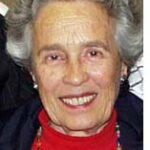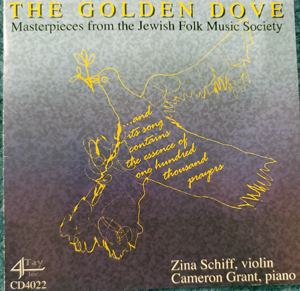
 SAN DIEGO — In commemoration of Israel’s Yom Hazikaron (Day of Remembrance) and Yom Ha’atzma’ut (Independence Day), I have selected my sister Zina Schiff’s recording, The Golden Dove, which was released by 4Tay Records. Although the recording features composers of Russia’s Society for Jewish Folk Music, five of the composers on the recording — Engel, Weinberg, Rosowsky, Saminsky, and Achron — spent time in Palestine and influenced the early music of the pre-state Yishuv (Jewish settlement in Palestine).
SAN DIEGO — In commemoration of Israel’s Yom Hazikaron (Day of Remembrance) and Yom Ha’atzma’ut (Independence Day), I have selected my sister Zina Schiff’s recording, The Golden Dove, which was released by 4Tay Records. Although the recording features composers of Russia’s Society for Jewish Folk Music, five of the composers on the recording — Engel, Weinberg, Rosowsky, Saminsky, and Achron — spent time in Palestine and influenced the early music of the pre-state Yishuv (Jewish settlement in Palestine).
Most of The Golden Dove is devoted to the music of composers who belonged to the Society. However, the opening selection, “Hebrew Love Song,” is by Rimsky-Korsakov, the non-Jewish Russian composer who inspired his Jewish students at the St. Petersburg Conservatory to write music based on their ethnic folk and liturgical music.
Yoel Engel (1868-1927), founder and leader of the Society for Jewish Folk Music, lived the last three years of his life in Palestine and died in Tel Aviv.
Engel earned a law degree from the Kharkov University before graduating from the Moscow Music Conservatory. He served as the senior music critic for Russia’s leading newspaper, Moscow Russkiya Vedomosti.
In 1900, he presented a lecture on Jewish Folk Music for the Imperial Russian Society for Science, Anthropology and Ethnography, performing his settings of Yiddish folk songs. That laid the groundwork for the government’s recognition of a distinct Jewish musical idiom. Eight years later, Russia granted permission for the establishment of the Society for Jewish Folk Music.
At its height, it numbered 900 members, published hundreds of works and organized Jewish music concerts and lectures throughout Russia. The SJFM existed until the 1917 Russian Revolution.
The Golden Dove contains nineteen selections by eight of the most prominent composers from the SJFM. Gramophone Magazine wrote, “Schiff is to be commended for shining a light on this underrepresented corner of musical history.”
Yoel Engel immigrated to Palestine in 1924, where he taught composition and piano at the Shulamith Conservatory in Tel Aviv, lectured, and wrote songs about the life of the emerging nation. Modern day Israel remembers Yoel Engel with Tel Aviv’s Engel Prize for Israeli Composers. He was called “The Father of Jewish Music.”
In the 1940s, when I was a member of the Labor Zionist Youth Movement, Habonim, I remember singing many of Engel’s songs such as, “Chalutz B’Ney (Pioneer, Build!),” “Lo Nelach Mi Po (We Will Not Leave Here),” and the lovely lullaby, “Numi, Numi (Sleep, Sleep).” Some of his songs are still sung today. They had Yiddish and Russian-style melodies.
Jacob Weinberg (1879-1956) was another major figure of the SJFM. He came from Odessa and, like Engel, studied at the Moscow Conservatory. His compositions were widely performed and he toured Russia as a virtuoso pianist.
In 1925, he settled in Jerusalem, where he helped establish the Music Conservatory, He composed music based on Yemenite, Sephardic, Chassidic and Arabic themes. His folk opera, “Hechalutz (The Pioneer),” was the first Jewish folklore opera to receive international recognition. He left Jerusalem for New York in 1928. There, he taught at Hunter College and the Hebrew Union College.
Salomon Rosowsky (1878-1962), son of the foremost cantor of Riga, Latvia, was another of the founders of the SJFM. He studied with Rimsky-Korsakov at the St. Petersburg Conservatory and was steeped in Ashkenazi Synagogue music.
In 1925, he moved to Palestine, becoming the Director of the School for Cantors, composing and writing a seminal volume, still in use, The Music of the Pentateuch: Analysis of the Biblical Trope. After twenty two years in the struggling Yishuv, he left for the United States, the year before the Jewish State was born.
Lazare Saminsky (1882-1959), another student of Rimsky-Korsakov’s at the St. Petersburg Conservatory, used synagogue motifs for his compositions. He lectured in Palestine when he stopped there on his way to France, enroute to the United States, where he became Director of Music for Temple Emanu-El in New York City, organizing festivals of Jewish Music.
Joseph Achron (1886-1943) was a violin virtuoso who studied at the St. Petersburg Conservatory along with Zina’s great teacher, Jascha Heifetz. Achron was drawn to Palestine, arriving the same year as Yoel Engel. However, he was not able to adapt to the harsh conditions of the fledgling Yishuv and left the following year, to join his brother, Isadore, in the United States. Isadore was the piano accompanist for Heifetz.
Other Jewish composers represented on the CD are the three that remained in Russia, Alexander Krein (1883-1951) , Michael Gniessin (1883-1957) and Zenovi Feldman (1893-1942).
The sample selections that relate to Yom Hazikaron and Yom Ha’atzma’ut are Weinberg’s “Berceuse Palestinniene,” accompanied by Zina’s younger daughter, Cherina Carmel, on piano, (track 10 above), and Engel’s “Freilachs,” with Cameron Grant on piano, (track 3, below). This CD was produced in 2002, with Cherina Carmel serving as the producer and the artist for the cover’s golden dove.
The Weinberg work represents the somber sadness of Yom Hazikaron, a lullaby sung by a mother to her son. The Engel piece reflects the celebration of the establishment of the State of Israel.
*
Eileen Wingard, a retired violinist with the San Diego Symphony, is a freelance writer specializing in coverage of the arts. She may be contacted via eileen.wingard@sdjewishworld.com
Pingback: Instrumental Four violin pieces by Zina Schiff in celebration of Jerusalem Day Music - Instrumental Music
Pingback: Four violin pieces by Zina Schiff in celebration of Jerusalem Day - San Diego Jewish World
Thank you Eileen for sharing this beautiful, moving music by your sister, and the history.